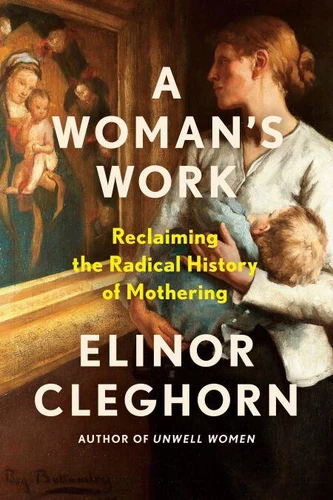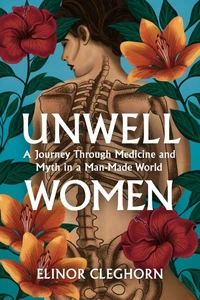A Woman's Work. Reclaiming the Radical History of Mothering
Par :Formats :
Actuellement indisponible
Cet article est actuellement indisponible, il ne peut pas être commandé sur notre site pour le moment. Nous vous invitons à vous inscrire à l'alerte disponibilité, vous recevrez un e-mail dès que cet ouvrage sera à nouveau disponible.
Disponible dans votre compte client Decitre ou Furet du Nord dès validation de votre commande. Le format ePub protégé est :
- Compatible avec une lecture sur My Vivlio (smartphone, tablette, ordinateur)
- Compatible avec une lecture sur liseuses Vivlio
- Pour les liseuses autres que Vivlio, vous devez utiliser le logiciel Adobe Digital Edition. Non compatible avec la lecture sur les liseuses Kindle, Remarkable et Sony
- Non compatible avec un achat hors France métropolitaine
 , qui est-ce ?
, qui est-ce ?Notre partenaire de plateforme de lecture numérique où vous retrouverez l'ensemble de vos ebooks gratuitement
Pour en savoir plus sur nos ebooks, consultez notre aide en ligne ici
- Nombre de pages416
- FormatePub
- ISBN978-0-593-47271-2
- EAN9780593472712
- Date de parution17/03/2026
- Protection num.Adobe DRM
- Infos supplémentairesepub
- ÉditeurDutton
Résumé
From the author of Unwell Women comes a powerful and groundbreaking new narrative history of motherhood and mothering. Mothers make history. But what it has meant for mothers to do the physical and emotional work of mothering has, for centuries, been neglected in the stories of the past. Patriarchal control of motherhood has relegated the acts of growing, birthing, nurturing, and loving to the sidelines, and deemed it unimportant, women's work.
Now, through the voices of women themselves, Elinor Cleghorn reclaims and retells the history of motherhood, showcasing the mothers, othermothers, midwives, activists, community leaders, and more who have shaped the course of history. Beginning in the ancient world, we encounter a figurine made for a childbirth ritual over three thousand years ago. We meet extraordinary writers and poets, like Anne Bradstreet and Elizabeth Jocelin, who were expressing their innermost feelings about motherhood.
During the seventeenth century, in the streets of London, we encounter unmarried mothers struggling against stigma and shame, and the women who strove to help them. Later, pioneers like Mary Wollstonecraft laid the intellectual foundation for the liberation of motherhood from male control, and the abhorrent treatment of enslaved mothers was brought to public attention by courageous activists like Sojourner Truth.
These and many other brave characters lobbied for mothers of all classes and circumstances to be valued, respected, and supported--not as reproductive vessels, but as people.
Now, through the voices of women themselves, Elinor Cleghorn reclaims and retells the history of motherhood, showcasing the mothers, othermothers, midwives, activists, community leaders, and more who have shaped the course of history. Beginning in the ancient world, we encounter a figurine made for a childbirth ritual over three thousand years ago. We meet extraordinary writers and poets, like Anne Bradstreet and Elizabeth Jocelin, who were expressing their innermost feelings about motherhood.
During the seventeenth century, in the streets of London, we encounter unmarried mothers struggling against stigma and shame, and the women who strove to help them. Later, pioneers like Mary Wollstonecraft laid the intellectual foundation for the liberation of motherhood from male control, and the abhorrent treatment of enslaved mothers was brought to public attention by courageous activists like Sojourner Truth.
These and many other brave characters lobbied for mothers of all classes and circumstances to be valued, respected, and supported--not as reproductive vessels, but as people.
From the author of Unwell Women comes a powerful and groundbreaking new narrative history of motherhood and mothering. Mothers make history. But what it has meant for mothers to do the physical and emotional work of mothering has, for centuries, been neglected in the stories of the past. Patriarchal control of motherhood has relegated the acts of growing, birthing, nurturing, and loving to the sidelines, and deemed it unimportant, women's work.
Now, through the voices of women themselves, Elinor Cleghorn reclaims and retells the history of motherhood, showcasing the mothers, othermothers, midwives, activists, community leaders, and more who have shaped the course of history. Beginning in the ancient world, we encounter a figurine made for a childbirth ritual over three thousand years ago. We meet extraordinary writers and poets, like Anne Bradstreet and Elizabeth Jocelin, who were expressing their innermost feelings about motherhood.
During the seventeenth century, in the streets of London, we encounter unmarried mothers struggling against stigma and shame, and the women who strove to help them. Later, pioneers like Mary Wollstonecraft laid the intellectual foundation for the liberation of motherhood from male control, and the abhorrent treatment of enslaved mothers was brought to public attention by courageous activists like Sojourner Truth.
These and many other brave characters lobbied for mothers of all classes and circumstances to be valued, respected, and supported--not as reproductive vessels, but as people.
Now, through the voices of women themselves, Elinor Cleghorn reclaims and retells the history of motherhood, showcasing the mothers, othermothers, midwives, activists, community leaders, and more who have shaped the course of history. Beginning in the ancient world, we encounter a figurine made for a childbirth ritual over three thousand years ago. We meet extraordinary writers and poets, like Anne Bradstreet and Elizabeth Jocelin, who were expressing their innermost feelings about motherhood.
During the seventeenth century, in the streets of London, we encounter unmarried mothers struggling against stigma and shame, and the women who strove to help them. Later, pioneers like Mary Wollstonecraft laid the intellectual foundation for the liberation of motherhood from male control, and the abhorrent treatment of enslaved mothers was brought to public attention by courageous activists like Sojourner Truth.
These and many other brave characters lobbied for mothers of all classes and circumstances to be valued, respected, and supported--not as reproductive vessels, but as people.




